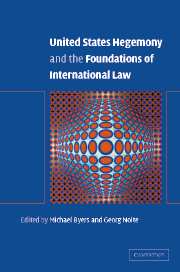Book contents
- Frontmatter
- Contents
- List of contributors
- Preface
- Introduction: the complexities of foundational change
- PART I International community
- PART II Sovereign equality
- 4 Sovereign equality – “the Wimbledon sails on”
- 5 More equal than the rest? Hierarchy, equality and US predominance in international law
- 6 Comments on chapters 4 and 5
- PART III Use of force
- PART IV Customary international law
- PART V Law of treaties
- PART VI Compliance
- Conclusion
- Index
4 - Sovereign equality – “the Wimbledon sails on”
Published online by Cambridge University Press: 13 July 2009
- Frontmatter
- Contents
- List of contributors
- Preface
- Introduction: the complexities of foundational change
- PART I International community
- PART II Sovereign equality
- 4 Sovereign equality – “the Wimbledon sails on”
- 5 More equal than the rest? Hierarchy, equality and US predominance in international law
- 6 Comments on chapters 4 and 5
- PART III Use of force
- PART IV Customary international law
- PART V Law of treaties
- PART VI Compliance
- Conclusion
- Index
Summary
The disappearance of the USSR is one of the most important changes in a world governed by international law because, for the first time since the international legal system came into existence, one country, the United States, is the only superpower, an “hyperpuissance” in the words of former French Foreign Minister Hubert Vedrine. Actually, the United States was already an “hyperpuissance,” but was more or less challenged by the USSR. The most significant change is that, since 1992, no State has seemed powerful enough to resist the United States' policy. This situation has not been seen since the Roman Empire, and it may be feared that the United States could take advantage of its predominance to rule the world according to its own and sole will. It cannot be denied that the whole international system has been drastically disrupted. This change will certainly produce changes in the substance of some rules, and maybe in some mechanisms of international law. However, it is questionable whether it will provoke fundamental alterations in the international legal system, especially as concerns the basic principle on which the international legal order rests, namely sovereign equality.
One of the particularities of the international legal system is that it has to deal constantly with the principle of equality, whereas domestic systems do not.
- Type
- Chapter
- Information
- United States Hegemony and the Foundations of International Law , pp. 117 - 134Publisher: Cambridge University PressPrint publication year: 2003
- 4
- Cited by



